Mechanical Systems Engineering
The graduate school offers three advanced courses of study for students enrolled in the doctoral and master’s programs: 1. Thermal and Fluid Engineering, 2. Solid Mechanics / Design and Production Engineering, and 3. Materials Design and Processing.
1 Thermal and Fluid Engineering
The objective of this course is to enhance knowledge of theories and applications of effective energy conversion and its utilization for environmental harmony. The research topics are as follows:
- Cooling of electronic equipment
- High-temperature gas dynamics
- Shock wave phenomena
- Heat and mass transfer
- Non-intrusive flow measurement
- Thermodynamic property measurement and modeling
2 Solid Mechanics / Design and Production Engineering
There are three major research fields in this course. These are mechanical design, materials and mechanics, and design methodologies. The research topics are as follows:
(1) Mechanical Design
- Tribological properties of hard coatings
- Evaluation of mechanical properties of micro materials
(2) Materials and Mechanics
- Structural reliability
- Structural design
- Experimental mechanics
- Large scale finite element method
- Molecular dynamics method
(3) Design Methodologies
- Shape modeling with free-form deformation and interactive design
- Life cycle design method by LCA and CAE
- Analysis of automotive vibration and noise
3 Materials Design and Processing
This program includes three research fields. These are structural materials, material processing, and environmental conscious materials. The research topics are as follows:
(1) Structural Materials
- Fatigue and fracture of polymers and composites
- Mechanics of nanocomposites and smart composites
(2) Material Processing
- Plastic forming of advanced lightweight alloys
- Powder metallurgy of advanced materials
- Characterization of advanced sintered materials
- Creep analysis of advanced lightweight materials
- Solid state bonding of advanced lightweight materials
(3) Environmental Conscious Materials
- Biomedical material science and engineering using green lithography
- Eco-friendly electronic material derived from biomass

Intelligent Robotics
The Graduate School of Intelligent Robotics aims to cultivate versatile professionals with a broad knowledge base and a wide perspective that spans across the fields of mechanical engineering, electronic engineering, and information engineering. While emphasizing expertise in one of these core areas, Intelligent Robotics focuses on developing individuals who can design intelligent systems by acquiring advanced knowledge in the chosen domain and simultaneously gaining related knowledge in peripheral domains. To achieve this goal and foster researchers and engineers capable of developing a wide range of next-generation technologies from macro to micro levels, the program conducts education and research in the following four departments.
Functional Robotics
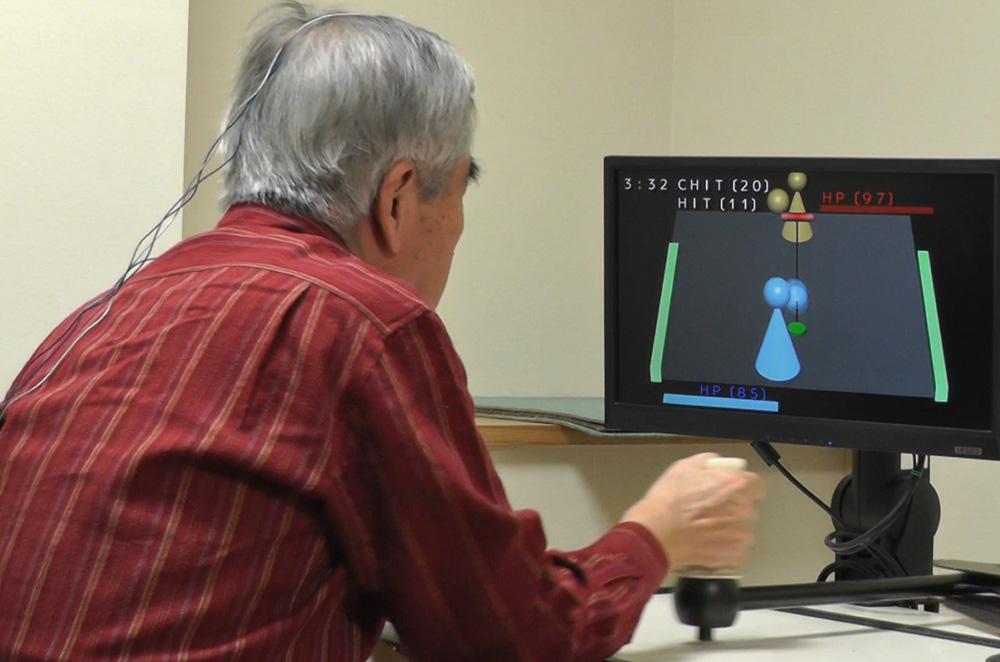
Students conduct research on intelligent robots and healthcare and welfare robots that are flexible and highly functional, based on mechatronics technology.
Intelligent Interface Engineering
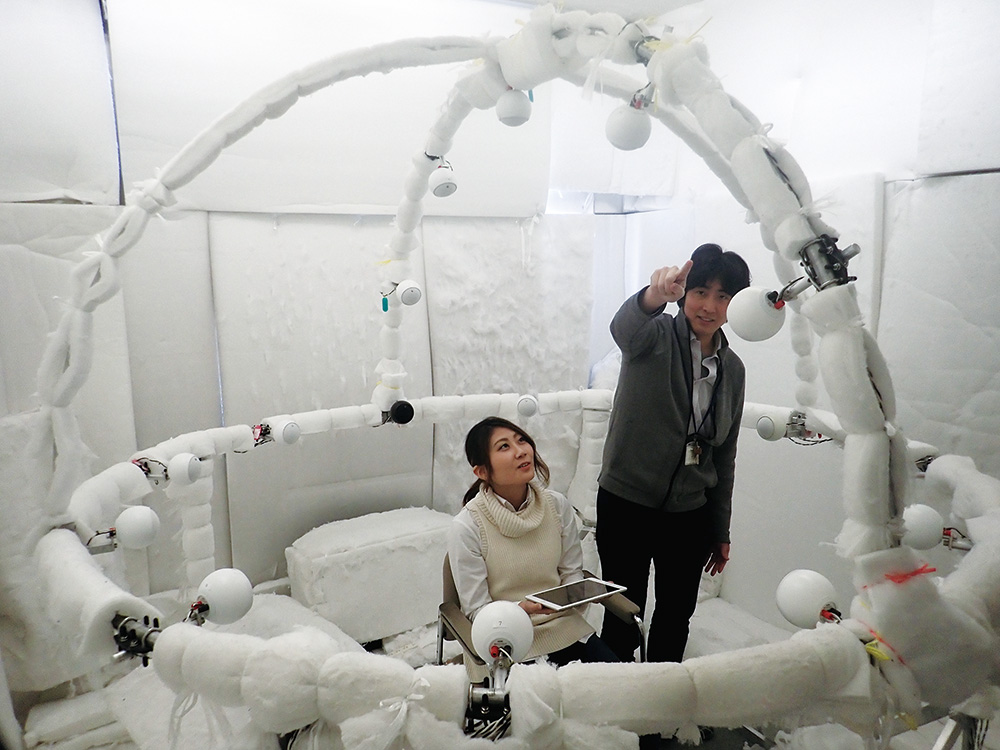
Students conduct research on elucidating the mechanisms of information processing in the human brain, such as vision and auditory processing. Additionally, we explore intelligent human interface technologies capable of flexible information processing similar to that of humans.
Intelligent Sensing Engineering
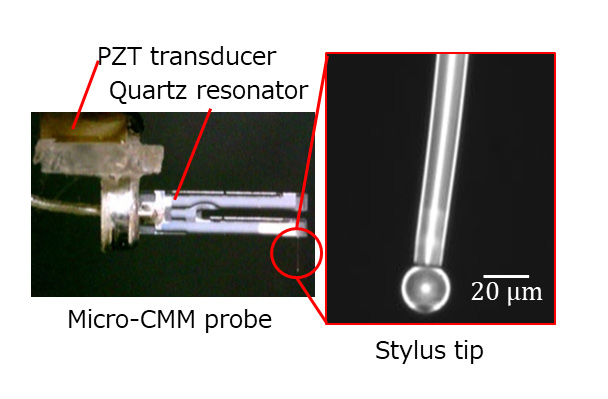
Students conduct research on machining and measurement techniques to make systems that intelligently operate robots, automobiles, and machine tools that are compact, lightweight, and highly functional.
Intelligent Information Systems Engineering

Students conduct research on intelligent information systems that create new value through the collaboration of humans and robots, aiming to contribute to life support, disaster relief activities, learning support, and driving assistance.
Electrical and Computer Engineering
The graduate school offers master’s and doctoral research programs in information systems engineering through the following three advanced courses: Information Media Engineering, Communication Network Engineering, and Software Engineering. These programs are designed for practicing professional engineers.
1 Information Media Engineering
This course involves promoting the development and establishment of various innovative information technologies. The scope of the course includes cloud computing, information networks, bio-information engineering with an emphasis on brain-machine interfaces, video image processing, and system planning and optimization. The course study also includes theoretical aspects such as formal language and computation theories.
2 Communication Network Engineering
This course includes diverse research on broadband network services, ubiquitous networks, and satellite communications. The projects also includes the development of support systems for daily life and the functionality of the Internet using photonic technologies and semiconductor devices (VLSI, CMOS devices, etc.) for advanced systems. Also, space environment measurements are conducted using sounding rockets, spacecrafts, and computer simulations for satellite communications in future.
3 Software Engineering
The objective of this course is to develop information systems for various industries, including medical and welfare support systems, home healthcare systems, education support systems, utilizing a variety of sensor devices, computers, and the Internet, based on the following fundamental technologies, sensor integration/fusion, human behavior recognition, information visualization, web-based programming, and so on.

Environmental and Civil Engineering
The current environmental problems face diversification of materials concerned, enlarging scale, increasing complexity of interaction among many phenomena. Therefore, we need bird-eye perspective and high-level technologies to solve the problems. Major disasters that happen frequently also urge us to equip with resilient infrastructure development and sustainable maintenance method. Our department develops experts who are capable to propose solutions to complex and diverse environmental problems, and to develop safe and secure society.
Environmental Engineering
This section conducts education and research on the efficient and advance utilization technologies on sustainable water and soil resource and the technologies for efficient circular utilization of energy and resources. The section also researches on water resources utilization, water reuse and recycle, environmental burden analysis and assessment, environmental and health risk assessment, new energy utilization and storage, and so on.

Study of accumulated snow 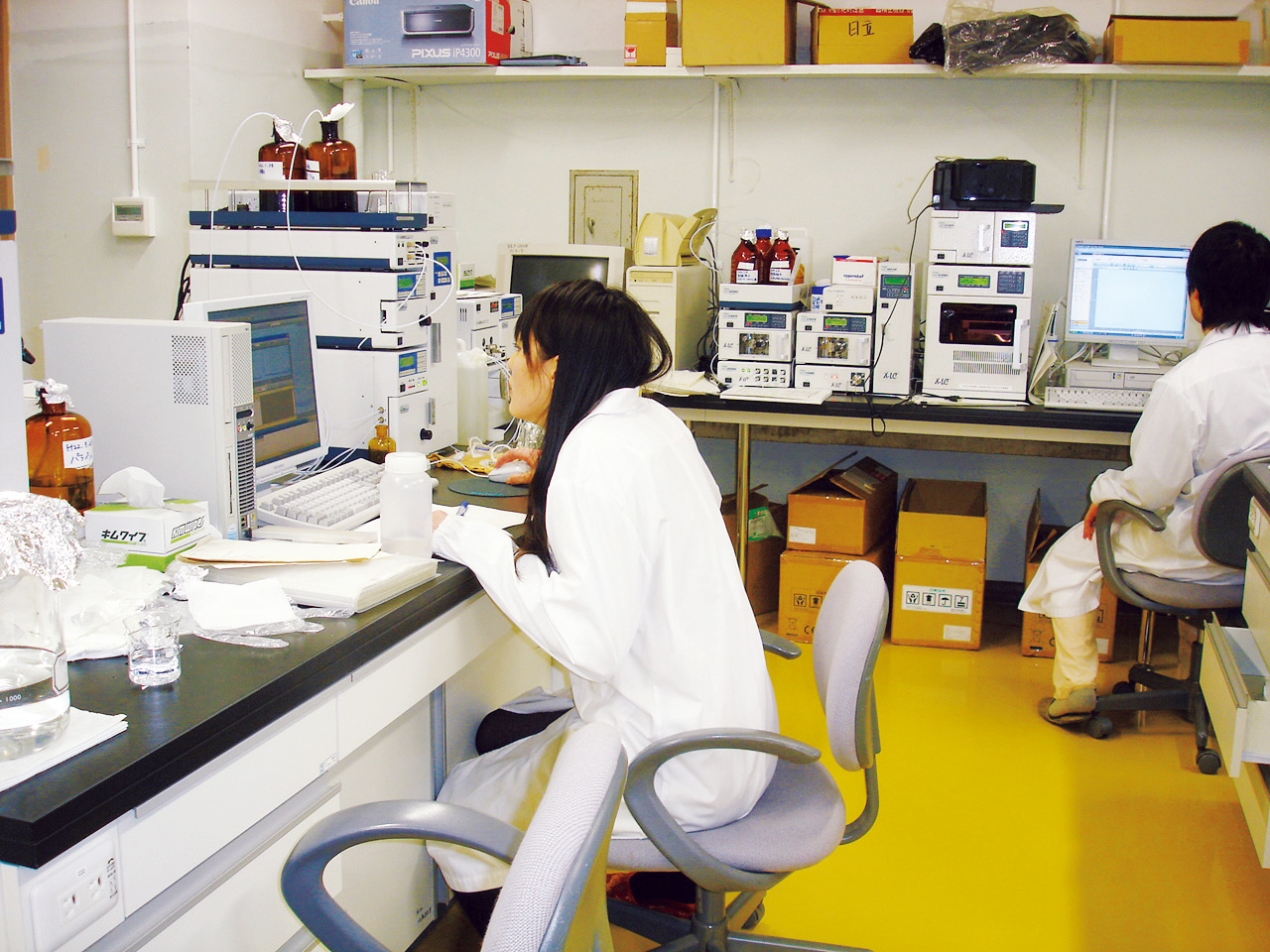
Environmental substance analysis
Civil Engineering
This section is in charge of education and research on infrastructure development that is a foundation for safe, secure and sustainable society. The researches include hydrological assessment and development of water resources, planning and management of regional environment, structure, material and maintenance technologies for infrastructure facilities, ground and watershed conservation technologies, GIS-based regional development technologies, disaster prevention and mitigation of river and coast, and climate change adaptation measures.
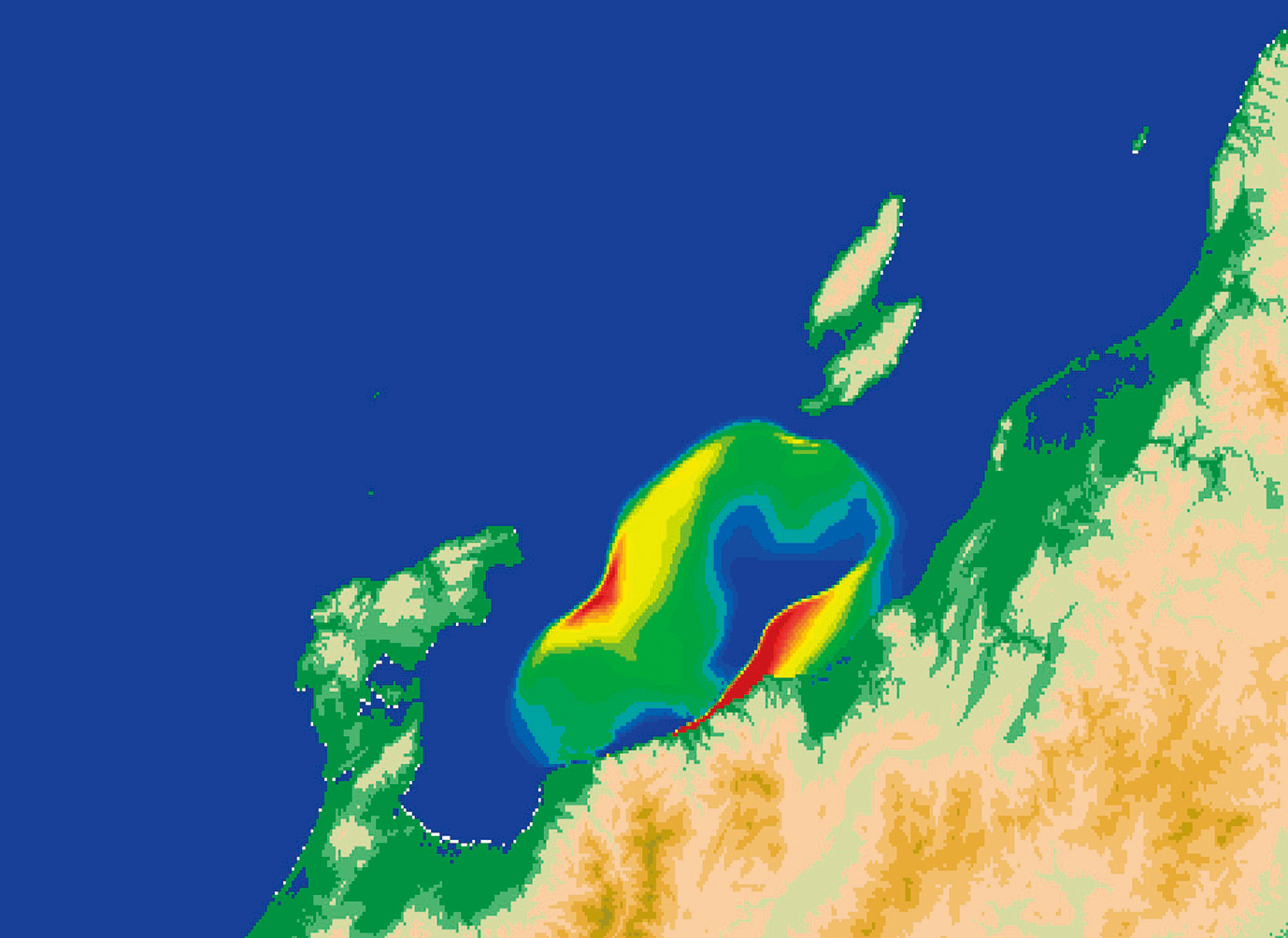
Simulation of tsunami in Toyama Bay 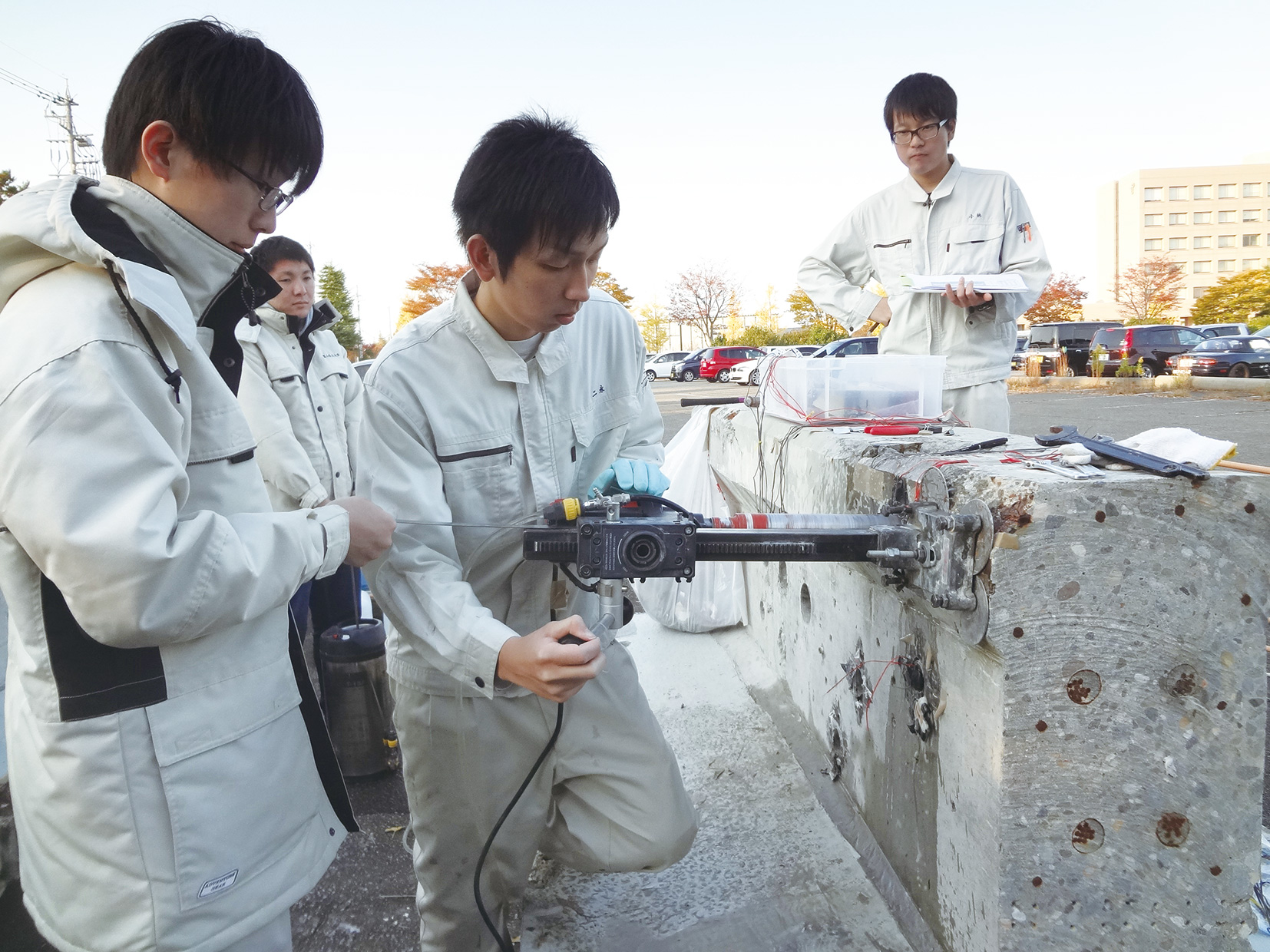
Inspection technology of bridge girder
Biotechnology and Pharmaceutical Engineering
The graduate school offers master’s and doctoral research programs in Biotechnology that include nine research areas. The faculty is responsible for facilitating education and research in advanced courses of study that cover the following themes under each research area.
1 Enzyme Chemistry
Extensive screening for novel enzymes catalyzing new reactions, intensive basic studies to understand enzymological characteristics, and molecular evolutionary approach to improve the properties of enzymes, thus supporting industrial use of enzymes.
2 Biocatalysis and Bioprocessing
The use of enzymes and/or microorganisms (biocatalysts) for the efficient production of useful compounds such as pharmaceutical and agrochemical intermediates, asymmetric bioreduction or biooxidation, metagenomics for biocatalysis, functional food materials, and protein engineering of biologics.
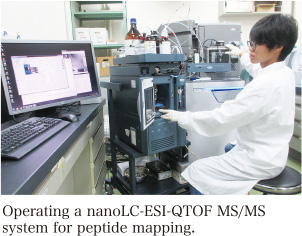
3 Microbial Engineering
Exploration of new bioactive compounds from underexploited marine and terrestrial microorganisms, structure elucidation, evaluation of bioactivity, and biosynthesis.
4 Bioorganic Chemistry
Total synthesis of bioactive natural products, computational analysis of organic reactions, computer-aided designs of bioactive molecules, and structure and reactivity of lignin and other woody biomass constituents.
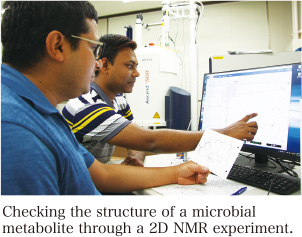
5 Food Science and Technology
Metabolism of biofactors including physiological and dietary compounds, evaluation of food factors using animal models for human diseases, and omics in food science research.
6 Plant and Cell Engineering
Engineering of plants and plant cells for their use in bioactive compound production and biomass utilization and study of plant secondary metabolic enzymes in biochemistry and organic chemistry.
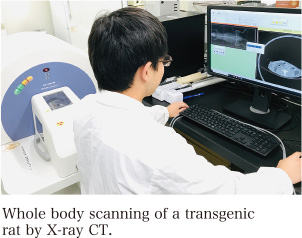
7 Applied Bioinformatics
Elucidation of genome evolution mechanism and establishment of genome creation of microbial cells with the designed genome.
8 Pharmaceutical Chemistry and Formulation
Organic chemistry, process chemistry, fine chemistry, analytical chemistry, advanced lithography, functional materials, chemical engineering, powder engineering, drug delivery system.
9 Biopharmaceutical Engineering
Biochemistry, genetic engineering, drug metabolism, cell engineering, protein chemistry, bioinformatics, protein design, antibody engineering, drug discovery, pharmacology, and regenerative medicine.



